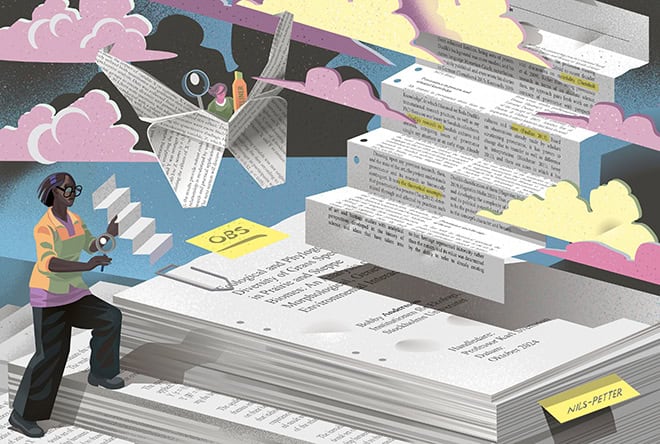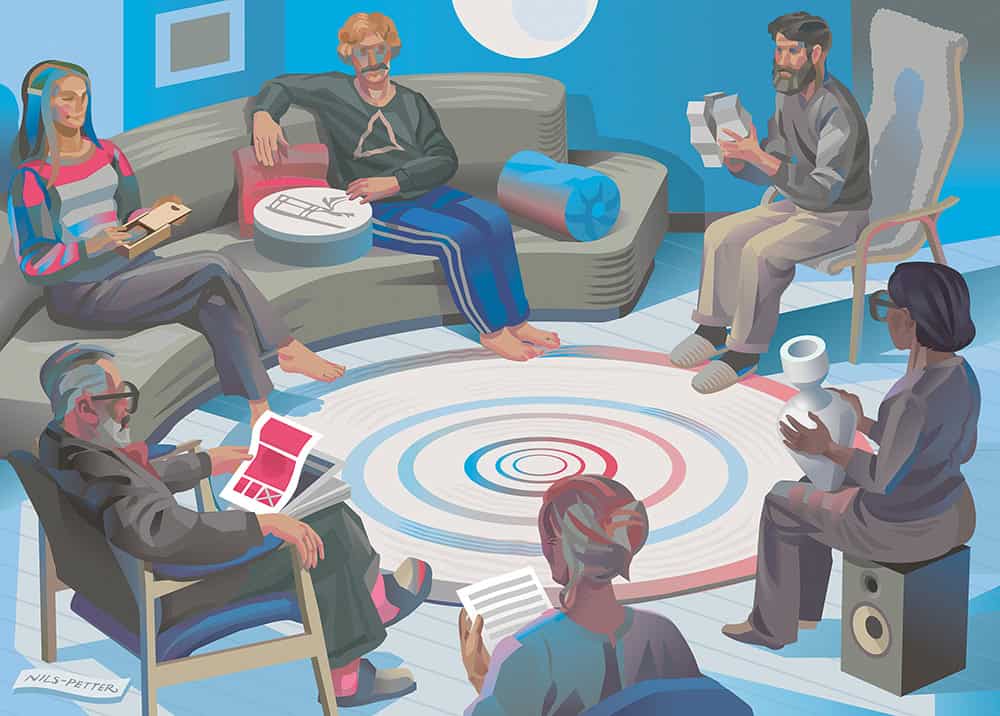Peer review is a cornerstone of the research system and thus part of every researcher’s job. Or is it? The widely acknowledged difficulty in recruiting reviewers suggests that not everyone is pulling their weight to the same extent as they are submitting research for peer review themselves. Lack of time and lack of recognition of review work when it comes to career development and qualifications are usually two of the explanations.
One person who wants to promote peer review and to develop competence levels is Claudia Bernhard-Oettel, a professor of organizational psychology at Stockholm University. She is an experienced reviewer as well as an editor for the scientific journal Scandinavian Journal of Work and Organizational Psychology.
Her peer review assignments have made her a better researcher and writer. The fact that her input can improve a submission also gives great satisfaction, she says.
“It makes me feel that I have contributed to producing good research that is of benefit.”

Claudia Bernhard-Oettel
Professor of organizational psychology at Stockholm University
Bernhard-Oettel learned the art of peer review through practice, and by consulting colleagues when in doubt. Publishers and journals are now also better at explaining what they want and do not want peer review to focus on, providing guidelines, tips and response forms.
In general, the reviewer must answer questions such as: Is the research question clear? Are the chosen methods, theories and data appropriate to answer it? Are the analysis and conclusions substantiated? What does the study add to the research field?
When she started, Bernhard-Oettel thought that the most difficult part was to judge the level of detail at which she would make her comments. Criticism that is too general makes for a poor review, but a review that gets bogged down in details can also miss the mark.
Finding the right balance is important, she explains.
“Your eye for what is important and what is not gets better the more submissions you review. You build an understanding for what is easy to change and what is not, and what is so serious that you cannot recommend that an article be published.”
What improves the quality of a review is that the views are specific, substantiated and constructive.
“Your job is to help people to do better research, not to put people down,” she says.
The reviewer is the editor’s expert eyes and therefore needs to have honest and open communication with the editor, she emphasises. As an editor, she wants to know the reviewer’s thoughts and uncertainties both regarding the paper and their own assessment.
If the comments do not fit with the formal review text, they can be submitted to the editor separately.
“It is very helpful, for example, if the reviewer draws my attention to the fact that a similar article has been published elsewhere, or that the author may have a conflict of interest.”
She herself thinks that reviewing interdisciplinary research is the most difficult. Is she reacting to a calculation or a style of writing because it is of poor quality or simply because she is not used to the scientific tradition?
“In such cases, I usually ask a colleague in the field whether they would react to it, or I mention my uncertainty in a comment to the editor.”
A difficult assessment as an editor, she thinks, is when the reviewer believes that the article needs further references – and refers to their own studies.
“When that happens, it could be that the reviewer is trying to benefit by increasing their own citation factor. You don’t just have to refer to your own works,” says Bernhard-Oettel.
Someone else who has worked with peer review for many years is Christina Lenz, who is a publishing editor at Stockholm University Press. During her career, she has seen that the requirements and quality of peer review have generally been improved. This applies not least to ethical matters.
Stockholm University Press uses the guidelines issued by the Committee on Publication Ethics, COPE. These state that a researcher should first and foremost only take on assignments within their area of expertise and should respond to enquiries within the stated time.
“The most common question we get is ‘Can I have more time?’” says Lenz.

Christina Lenz
Publishing editor at Stockholm University Press
The prospective reviewer must report all potential conflicts of interest that they may have regarding the assignment.
“Some people think ‘I may have worked on the same research project, but there is no conflict of interest because we are professional researchers and can review each other’s work.’ But the guidelines are strict and they need to be followed to prevent bias,” she says.
The COPE guidelines stipulate that the reviewer may not be employed by the same institution as the author, and they must not have had a mentoring relationship, been close collaborators or had a shared research grant in recent years. A conflict of interest can also be of a personal, political or religious nature.
If the reviewer discovers that they do not have the requisite expertise or that there is a conflict of interest only after reading the article, they must immediately bring this to the attention of the editor.
Confidentiality in the review process must be respected. If the reviewer wishes to involve other people in the review, the editor’s permission is required.
These people must then also be named in the review report, according to COPE’s guidelines.
If the reviewer suspects irregularities in the research, they must not investigate this themself, but inform the editor.
“Ethics is also about how you communicate your criticism. It must be factual and respectful. You should not only criticise, but also bring up what is good about the study,” says Christina Lenz.
How to become a reviewer and make a difference
Contact journals and publishers directly.
Network with editors at conferences.
Ask a colleague to recommend you.
Be focused, consistent and constructive in your criticism.
Ask more experienced colleagues for guidance.
Seek help from experts and courses on the internet.
Source: wileypeerreview.com



















